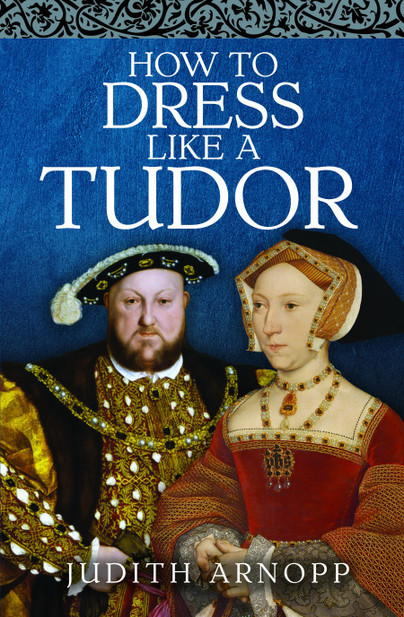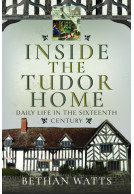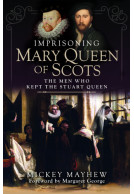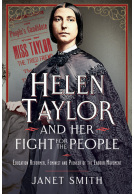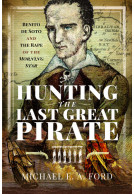How to Dress Like a Tudor (ePub)
Imprint: Pen & Sword History
File Size: 122.8 MB (.epub)
Pages: 224
ISBN: 9781399015363
Published: 4th October 2023
| Other formats available - Buy the Hardback and get the eBook for £1.99! | Price |
|---|---|
| How to Dress Like a Tudor Hardback Add to Basket | £25.00 |
Have you ever hankered to dress like a Tudor lord or lady, or perhaps you prefer the status of goodwife, or costermonger, or even a bawd?
For beginner historical reenactors, the path to authenticity can be bewildering and sometimes intimidating. Judith Arnopp uses her own experience, both as a historian and a medieval/Tudor lady, to make your own journey a little easier.
The author traces the transition of fashion from the relatively subtle styles popular at the court of Henry VII, through the carefully constructed royal grandeur of Henry VIII, Edward VI, and Mary I to the pinnacle of majesty and splendid iconography of Elizabeth I.
In contrast to the magnificence of court come the ordinary folk who, subject to sumptuary laws and regulations, wore garments of a simpler cut and cloth – a strata of society that formed the back bone of Tudor England.
This brief history of sixteenth century fashion examines clothing for both rich and poor, adult and child, and offers tips and tricks on how to begin to sew your first historically inspired garment, this book is aimed at helping the beginner learn How to Dress like a Tudor.
I am a serious Tudor history nerd, and while I don't necessarily have a Tudor costume planned, I still couldn't resist giving this book a look through. The information is interesting and well researched, and the attention to detail is great. It makes me wish I had a reason to put together a complete Tudor outfit and wear it around! If you are interested in reenacting, the Tudor period, or just historical fashion in general, I would definitely recommend this!
NetGalley, Vanessa Edwards
Such a fun little gem of a book and I think it would be of interest not only for those who love all things Tudor, but for those with an interest in the history of fashion.
NetGalley, Sarah Mueller
I requested this one just based on the title, so I did not know at the time that it was also a how-to guide for those wanting to make their own Tudor clothing.
The author is also a re-enactor of the medieval and Tudor periods, so her knowledge is vast and incredibly helpful for those wanting to get a start in doing the same. Authenticity is so important, so it's easy to see why guides like this would be very helpful.
The author also makes sure to include ALL who lived in the period, not just royalty, so there are a variety of choices. Obviously there were far more ordinary, every-day people - who were not allowed to wear any colors or cloth but the most basic garments. Sumptuary laws dictated what each class could wear and there could be heavy fines for anyone dressing above their station.
Something I also appreciated was that the author explained the history of clothing From Henry VII to Elizabeth I and how it evolved in such a short time. No one can ever accuse Henry VIII or Elizabeth I of being shy and their clothing certainly reflected their inflated opinions of themselves.
The author divided the pieces by women, men, and children. She descrobes each piece that would have been worn, the order they had to be put on, and how pieces evolved. I also liked that she included photos from the period as examples. Then there are the step-by-step guide for how to make the garments. I have never sewn a day in my life outside of school, but still found it really interesting. My daughter loves fashion and designing clothing so I think she would love this as well (she's 11), to see how clothing has changed over the centuries.
Highly recommended.
Rating: 5 out of 5 stars
NetGalley, Ashley Maimes
Every time I picked up "How to Dress Like a Tudor", I was whisked back in time, and learned something about The Tudor Era, and the clothing worn during that time.
Judith Arnopp is a phenomenal writer who makes history jump right off of the page. She is extremely knowledgeable about the subject matter she focuses on, and I can only imagine the amount of research she must have done, and history came to life right before my eyes.
This non-fiction read delves into the Tudor Era, and the fashions and fabrics that were worn during that time period. Focusing on different social classes, what some people were and were not allowed to wear, and how fashion and symbolism could be used to make a specific statement, this book is so intriguing and incredible information. I also found the parts about being a historical reenactor, and the fashion for that really interesting and helpful as well!
If you enjoy anything related to The Tudors, and / or Historical Fashion, I highly recommend this book!
Rating: 5 out of 5 stars
NetGalley, Jenny Scott
As a history and historical fashion nerd, and a historical costumer, I really enjoyed this book. The author is a historical reenactor and she really knows her stuff! The history or Tudor clothing has always fascinated me and the author did a great job explaining the Tudor era fashions. From royalty to common folk, this author provided a wealth of knowledge. She included may pictures of portraits from the time and explained why certain pieces of clothing were worn. She also included pictures of the clothes that she has made for her reenactments. She even walks you through, step-by-step on how to make several pieces of Tudor replica outfits.
As a historical costumer I plan to return to this book time and time again on various projects. I am excited to read more from this author.
Rating: 5 out of 5 stars
NetGalley, Annie Buchanan
There are masses of information here about how different socioeconomic classes dressed during the Tudor period (1485-1603). The author has an informal but precise style of writing and the chapters are liberally sprinkled with clear photography and graphics. The book is well annotated throughout and the bibliography will provide many hours of further reading. The chapters are arranged by item of clothing: underpinnings, kirtles, overgowns, accessories, shirts, codpieces, headwear, men's gowns & coats, men's accessories, children's clothing, and a really great chapter on recreating the looks for modern wearers, including pattern drafting, construction, and modern fabric choices to mimic period pieces.
Five stars. This would be a super choice for public or school library acquisition, for home use, theatre/costume groups, and a must-have for SCAdians and re-enactors.
Although I'm a dedicated Tudorphile I've never yearned to dress like one of them. Those ruffs in late Tudor times look quite uncomfortable for starters. But author Judith Arnopp has dressed like a Tudor for various reasons, and explains how she has done so on a budget.
NetGalley, Gail Hanlon
She traces the transition of fashion from the relatively subtle styles popular at the court of Henry VII, through the carefully constructed royal grandeur of Henry VIII, Edward VI, and Mary I to the pinnacle of majesty and splendid iconography of Elizabeth I.
Ordinary people, meanwhile, were subject to laws forbidding them from wearing certain fabrics or colours. Six months wages for a labourer would buy barely a yard of a cloth of gold. Robert Dudley, Earl of Leicester (1532-88) paid more for one suit than William Shakespeare paid for a house in Stratford-upon-Avon less than a decade later.
Arnopp also addresses the common perception we have that those in Tudor times must have had terrible body odour because they didn't bathe very often. The answer was their linen under clothes. Someone like Henry VIII would have changed his linens three times a day.
A fascinating read for anyone who loves fashion and history.
Rating: 5 out of 5 stars
NetGalley, Andrea Romance
Trace the evolution of Tudor fashion, from Henry VII's understated court garb to the iconic grandeur of Elizabeth I. This invaluable guide explores attire for both royalty and commoners, offering insights into rich and poor, adults and children. With helpful tips and tricks, it empowers readers to dress the part and easily recreate historically inspired Tudor garments.
This book is targeted toward historical reenactors, but it's also interesting for history enthusiasts. It's easy and fun to read, and it contains instructions at the end on how to construct garments.
Rating: 5 out of 5 stars
NetGalley, Anna Maria Giacomasso
I love history of fashion and this was a good one as it talks about how they dressed but also how the style changed with the different kings and queens.
It changed for the well-to-do as the poor were not affected
Highly recommended.
My daughter (9) and I are fans of everything Tudor and enjoyed reading this together. The author has meticulously researched every aspect of Tudor clothing and included so much detail and information. I especially found the new information about French hoods fascinating!
NetGalley, Hayley Remmington
This was an excellent book for people who want to visualize Tudor clothing and how it changed over the course of the era and across the social spectrum. Judith Arnopp is writing for those who want a good, hands-on approach to clothing and her experiences as a reenactor and the research necessary for making the clothing for her group bring the clothing to life here!
NetGalley, Anne Morgan
The book is wonderfully divided into men's, women's, and children's clothing, and Arnopp explores each individual piece and how it developed over the course of the Tudor era. Materials and sumptuary laws, as well as reasons behind many of these developments, are also covered, with photographs of paintings to help illustrate her descriptions of certain items of clothing. Finally, Arnopp covers being a reenactor and her best tips and tricks for choosing costumes, making garments, etc. with good illustrations along the way.
This is going to be a necessary book on your shelf if you are interested in the fashion history of the Tudor era, if you are a historical writer looking for help describing both the clothing and how it would have felt to wear them, or as a reenactor looking for inspiration and assistance!
I think if you are interested in reenactments or just Tudor fashion in general, I would highly suggest you read, “How to Dress Like a Tudor” by Judith Arnopp.
NetGalley, Heidi Malagisi
Rating: 5 out of 5 stars
NetGalley, Pam Baker
What a splendid contribution to Tudor fashion history for re-enactors and enthusiasts! Let’s face it, historical costuming is an irresistible rabbit hole for ‘dedicated followers of fashion’ drawn to a particular period. Author Judith Arnopp is one of that happy league. Tudor is her catnip, and she shares her wealth of accumulated knowledge, as both an author and re-enactor, in "How to Dress Like a Tudor."
This is a must-have book for anyone involved in re-enactment or Tudor costuming, or hoping to get with the program and not sure where to start. It’s also a helpful resource for historical fiction authors and readers who want to learn more about the elaborate symbolism and social significance of clothing during the 16th Century. Ms. Arnopp draws from the vast research that informs her historical novels to present a solid general overview of how fashion evolved during the period coupled with in-depth context around the role of clothing in shaping public perception of the Tudor monarchs.
Combining truly informative historical background with a how-to guide for people wanting to create costumes is not a recipe for a lightweight foray into the topic. Readers looking only for nothing more than some frothy re-enactment anecdotes and a couple of French hood patterns may find How to Dress Like a Tudor a heavy lift. Given the breadth of content, Ms. Arnopp settled on a sensible top-down structure, starting with a look at the power and psychology of the Tudor kings and Queens, especially the myth-building by Henry VIII and Elizabeth I. She explains the sumptuary laws that imposed restrictions on dress according to social status: only the royal family could wear purple, for example. During Elizabeth’s reign, the rules were expanded to include “ruffs, hose and the length of one’s sword.”
Clothing was fiercely expensive, and the types of fabrics available were limited. I was intrigued to learn more about the Field of the Cloth of Gold, that “pinnacle of Tudor extravagance.” Rich details like this set Ms. Arnopp’s book apart from those that focus more narrowly on costume alone.
The author goes on to discuss the individual clothing items worn by women, starting with the historical backdrop and then focusing on kirtles, gowns and accessories before continuing to shirts, men’s attire, and clothing for children. The final third of the book is the sewing guide component. A founder of the Fyne Companye of Cambria re-enactment group, she offers tips and hacks drawn from the trial and error of sewing her own costumes, and provides abundant black and white illustrations, portraiture images, and photographs of herself in various styles. Covering everything from codpieces to court dress to commoner, clerical, and battle attire, she explains how to choose and craft a costume achievable for various levels of sewing know-how, from novice to expert.
Sometimes the book feels rather dry and dull, and there will be readers who choose to skip over the deep-dive content in favor of the costuming nuts and bolts. But the point is: the meaty material is there in the first place. I have not seen a more thorough, well-grounded practical guide to Tudor costuming for people who do not work in museums or academia. The Regency Chronicle team highly recommends this well-targeted, well-written book. 5 stars, all round.
An engaging easy-to-read guide to Tudor clothing for today.
NetGalley, Jenny O'Brien
I haven't read any of Judith Arnopp's other works, but I sped through this because each part of it was so interesting and lightly told with humour and the confidence that comes from having done extensive research into a subject and being able to piece together facts, social context, and examples like they are a fine garment.
Rich detail is supported by practical knowledge, and primary sources and images, so that How to Dress Like a Tudor offers a fresh perspective on Tudor clothing, while using facts and sources that may be familiar to readers who have read around the subject before.
For anyone interested in getting a feel for Tudor life, then taking that further to walk in Tudor shoes (or dress), I'd recommend reading 'How To Be a Tudor: A Dawn-to-Dusk Guide to Tudor Life' for a great insight into 'a day in the life', also backed up by practical experience, followed by 'How to Dress like a Tudor' which confirms and expands on the aspects of dress that Ruth Goodman writes about. The two resources together are a great way to experience Tudor life with some authority even if you never put on a corset or codpiece.
Rating: 5 out of 5 stars
NetGalley, Katie Jamison
This was a good book! So much information about the clothing, the styles, the care, who was allowed to wear what.
It was so helpful in understanding how they lived.
Rating: 5 out of 5 stars
NetGalley, Vida Clark
Wardrobe seems to be overlooked when it comes to the Tudor period, but as the author mentions, other than what's mentioned in diaries or invoices, little is known about the material used or how the outfits were created during the Tudor time. There are obvious class differences and the intriguing part of How to Dress Like a Tudor is the exploration of the purposes of the outfits.
One area of interest from the book is the fact clothes were more than reflective of the status, but served hygienic purposes which were reflected in the series documentary "Tudor Monastery Farm" where Ruth Goode, historian, and her companions demonstrated what it was like to dress, work, and lived during this time period.
The rest of the chapter covers the author's own experience in creating her own Tudor-inspired clothing, along with basic guidelines which would serve those in the interest of theater, Renaissance fairs, historical fiction writing, and set designers' insight in recreating clothing wear for both personal and professional use.
The author helps illustrate how little is known about the material and wear of the outfits and reflects how there is still much to be gained in studying this fascinating time period, especially at a time when television and movies strive for historical authenticity.
For the casual and academically trained historian, the book is a useful resource to keep on the shelf. Along with the numerous primary sources, the recreation of the outfits by the author is a reminder sometimes the best form of research is by active recreation.
Overall, the book was a wonderful read, and help contribute to further interest in bringing to life, the Tudor time period.
Rating: 5 out of 5 stars
NetGalley, LOIS ELIYAHU
Fabrics, styles, and embroidery were part and parcel of the Tudor image. From kirtles and overgowns to doublets, codpieces and ruffs, this book tells all.There are also sections on accessories, dressing children and how to make your own Tudor garments.
It is a comprehensive book filled with relevant stories and humour. A very interesting and informative read.
‘No one ever links the name Tudor with the words ‘weak’ or ‘powerless’ and they achieved this reputation simply with the use of suitable clothing and exceptionally good artists.’
NetGalley, Georgi Lvs Books
This was a really enjoyable read. I am a Tudor addict and I am also really interested in fashion from the past.
My favourite parts to read were about the clothes of Henry VIII’s queens and children’s clothing.
I love that the author is part of a medieval and Tudor reenactment group!!!
The perfect read for Tudor and history readers.
‘A lady’s clothes marked her place in society. The quality of cloth, the volume necessary and the embellishment upon it immediately revealed her status, and her worth as well as her sense of style.
A nice little guide going through the different layers of a Tudor dress both for men and women. The author - an reenactor herself - gives valueble tips for sewing an outfit.
NetGalley, Sarah Matsson-Klingzell
I feel like this was quite well researched and, as always, I like when photos are included to give us readers a visual to what is described in the text.







